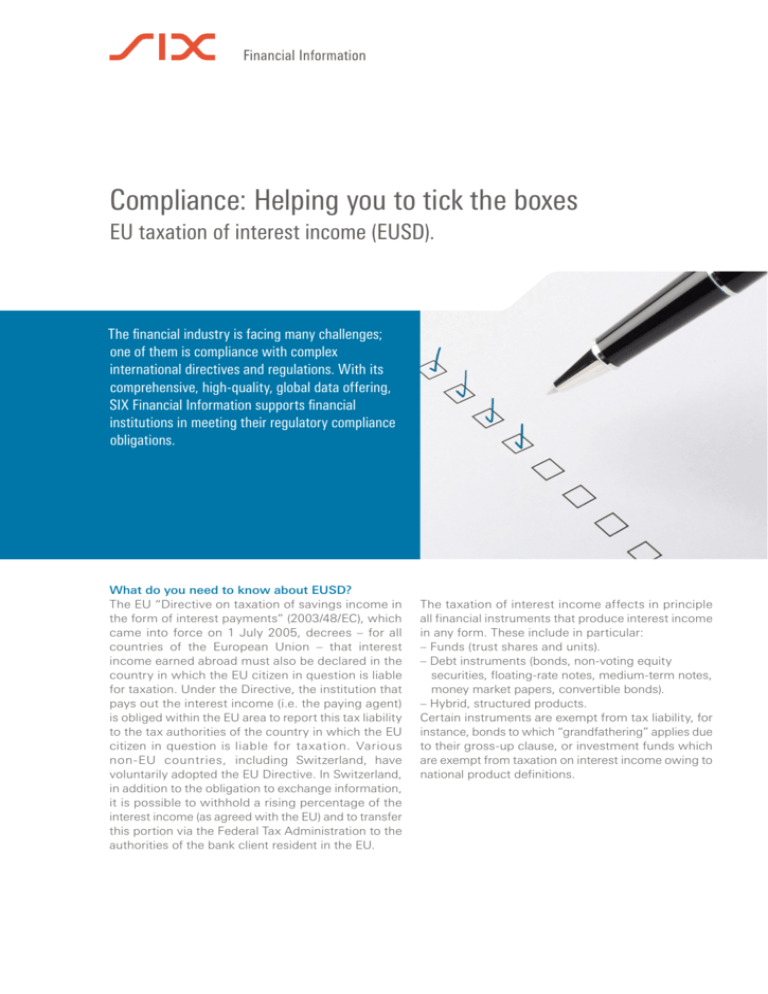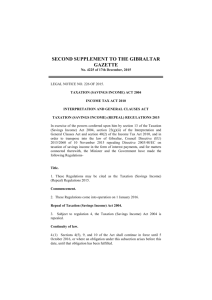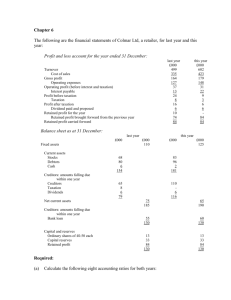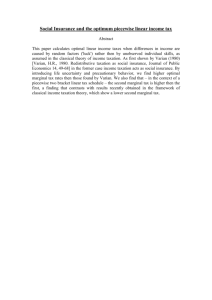EU taxation of interest income (EUSD)
advertisement

Compliance: Helping you to tick the boxes EU taxation of interest income (EUSD). The financial industry is facing many challenges; one of them is compliance with complex international directives and regulations. With its comprehensive, high-quality, global data offering, SIX Financial Information supports financial institutions in meeting their regulatory compliance obligations. What do you need to know about EUSD? The EU “Directive on taxation of savings income in the form of interest payments” (2003/48/EC), which came into force on 1 July 2005, decrees – for all countries of the European Union – that interest income earned abroad must also be declared in the country in which the EU citizen in question is liable for taxation. Under the Directive, the institution that pays out the interest income (i.e. the paying agent) is obliged within the EU area to report this tax liability to the tax authorities of the country in which the EU citizen in question is liable for taxation. Various non-EU countries, including Switzerland, have voluntarily adopted the EU Directive. In Switzerland, in addition to the obligation to exchange information, it is possible to withhold a rising percentage of the interest income (as agreed with the EU) and to transfer this portion via the Federal Tax Administration to the authorities of the bank client resident in the EU. The taxation of interest income affects in principle all financial instruments that produce interest income in any form. These include in particular: – Funds (trust shares and units). – Debt instruments (bonds, non-voting equity securities, floating-rate notes, medium-term notes, money market papers, convertible bonds). – Hybrid, structured products. Certain instruments are exempt from tax liability, for instance, bonds to which “grandfathering” applies due to their gross-up clause, or investment funds which are exempt from taxation on interest income owing to national product definitions. Who is affected? Paying agents have the heaviest workload. Paying agents are institutions that pay out interest income to a customer and that collect such income on behalf of a customer, e.g. banks, insurers, asset managers, auditors. The paying agents have a huge administrative workload since they are obliged to determine the taxable interest portion of investments, report this to the tax authorities in the bank customer‘s country of domicile or – in the case of countries with a treaty agreement – withhold a percentage of the income. For each liable customer, they must determine, whether each instrument or a portion of the instrument in the portfolio is subject to taxation on interest and how large this portion is in view of national fiscal legislation. This is a particularly complex procedure and can be subject to errors especially for composite instruments such as funds of funds or hybrid, structured products. This complex and error-prone process could ultimately disadvantage the paying agent‘s customer if the tax deduction is too high due to confusion surrounding the amount of withholding tax. SIX Financial Information helps you to be compliant SIX Financial Information supplies a data package tailored to the EU Directive on taxation of interest income. The package is based on a transparent system of rules which have been developed in cooperation with legislative offices and national and international tax specialists. The data helps you to determine which instruments are liable for taxation and establishes the taxable proportion for funds and structured products. SIX Financial Information flags all debt instruments which may be subject to taxation in accordance with these rules. Fund instruments are flagged on the basis of an annual declaration made by the issuing companies. For hybrid, structured products, SIX Financial Information analyzes the classification supplied by the issuing companies and determines the tax status for those products without a specific code provided. SIX Financial Information EUSD data offering For front office and investment advisory: – In scope (the instrument is in principle subject to the EU Directive, but may come under an exceptional ruling). – Out of scope (the instrument does not come under the Directive). – Unknown (the situation is not yet clear-cut, e.g. for funds before the issuer has made its declaration – and always valid for hybrid, structured products, because no EU-wide binding rules are in place. Country specific details need to be considered). For asset managers and portfolio analysts – incl. tax information: – In scope/out of scope with or without tax liability. – Grandfathered due to the gross-up clause (especially for debt instruments: instrument is subject to EU Directive but is exempt due to the grandfathering rule). – Country-specific exceptions. For back office and fund management – with detailed information for billing: – Interest portion of NAV/distribution. – Initial figure for the interest portion of the NAV. – TIS/TID. – Country levying the tax. – Tax threshold rate of the country in question. – Time of deduction of withholding tax depending on country specific threshold rate (“at distri­bution” and/or “sale/return”). For cross-border exchange of information EU/bilateral: – Exact information on what is taxed in each country (distribution, sale, redemption or repurchase). – Information about the structure of an instrument. – All components for each interest payment. – Special classification procedures for non-EU countries. For structured products in particular: – Instrument categories from which taxation can be derived (in accordance with the classification in Switzerland, which has been adopted by various EU countries). – Interest/premium portion. Advantages of central classification of data: – The classification of the securities does not have to be carried out by each bank individually. – The classification system is uniform and is also used by the national tax authorities. – The model is transparent and is based on a simple and flexible set of rules. – National tax definitions and special features are reported in a straightforward manner. – Adjustment to the EU Directive can be auto­ mated. Manual intervention is only necessary where the issuer‘s information is lacking. 01.13 / PDF only / dEf For more information, please contact your local SIX Financial Information office and a representative will be happy to assist you. SIX Financial Information Hardturmstrasse 201 P.O. Box CH - 8021 Zurich T+41 58 399 5111 Canada +1 416 915 4121 Denmark +45 33 411 111 Finland +358 207 334 043 Hong Kong +852 2971 0388 Ireland +353 1 213 0722 Japan Luxembourg Norway Singapore Sweden +81 3 3808 2271 +352 261 161 +47 23 326 620 +65 6338 3808 +46 8 5861 6300 UK +44 20 7550 5000 USA +1 203 353 8100 sales.global@six-financial-information.com www.six-financial-information.com










